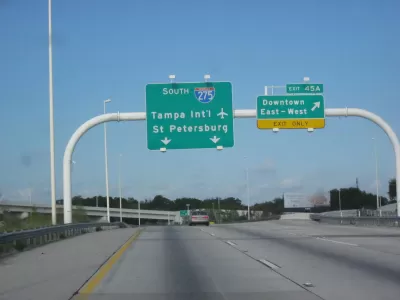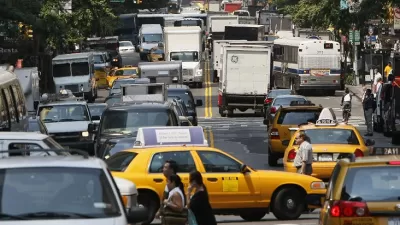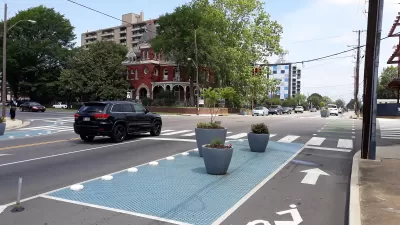Florida would seem to be the ideal place for walking and biking. It's flat as can be. But the state developed very much with the car in mind. Billy Hattaway, at the Florida Dept. of Transportation, wants to change that.

Since 2011, Billy Hattaway has been on a mission to make Florida convenient and—especially—safe for cyclists and pedestrians. It's no easy task. The state's roads are among the deadliest in the nation for people who aren't protected by two tons of steel. Streetsblog interviewed Hattaway about the progress he has made as the Florida Deptartment of Transportation's lead bike-ped official.
The problem with Florida's roads is rooted in the state's development patterns, according to Hattaway:
"From the mid-’60s on there was nothing but sprawl development. That was the result of things that the Federal Housing Administration put into place. There’s a lot of things that contributed to that. Certainly the focus on moving cars was a part of that. Everyone wanted the American dream. It’s a hard ship to turn. All the retail followed that pattern. Now we have these big box stores."
He says that he is approaching the challenge on two fronts: culture and design. Culture is coming along, but design will require extensive rebuilding:
"We have to equip our engineers with a different set of tools to do design. We had sort of a one-size-fits-all approach to street design, whether it was rural or urban. For example, we used 12-foot lanes everywhere In Florida DOT, we are changing our standards. If you’re a state route going through an urban area, the standard lane width will be 10 feet. We’re in the process of changing the standard. We’ve already adopted the 11-foot lane standard and we’ll be putting in the 10-foot lane here shortly. We’re using what I call context, volume, and speed. All three things need to be looked at, and context will have a much bigger role than it’s had in the past. We’ve treated context now as if it were landscaping — making the area pretty."
FULL STORY: Meet the Man on a Mission to Make Florida Walkable and Bikeable

Alabama: Trump Terminates Settlements for Black Communities Harmed By Raw Sewage
Trump deemed the landmark civil rights agreement “illegal DEI and environmental justice policy.”

Study: Maui’s Plan to Convert Vacation Rentals to Long-Term Housing Could Cause Nearly $1 Billion Economic Loss
The plan would reduce visitor accommodation by 25% resulting in 1,900 jobs lost.

Planetizen Federal Action Tracker
A weekly monitor of how Trump’s orders and actions are impacting planners and planning in America.

Wind Energy on the Rise Despite Federal Policy Reversal
The Trump administration is revoking federal support for renewable energy, but demand for new projects continues unabated.

Passengers Flock to Caltrain After Electrification
The new electric trains are running faster and more reliably, leading to strong ridership growth on the Bay Area rail system.

Texas Churches Rally Behind ‘Yes in God’s Back Yard’ Legislation
Religious leaders want the state to reduce zoning regulations to streamline leasing church-owned land to housing developers.
Urban Design for Planners 1: Software Tools
This six-course series explores essential urban design concepts using open source software and equips planners with the tools they need to participate fully in the urban design process.
Planning for Universal Design
Learn the tools for implementing Universal Design in planning regulations.
Caltrans
Smith Gee Studio
Institute for Housing and Urban Development Studies (IHS)
City of Grandview
Harvard GSD Executive Education
Toledo-Lucas County Plan Commissions
Salt Lake City
NYU Wagner Graduate School of Public Service





























